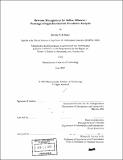Revenue management for airline alliances : passenger origin-destination simulation analysis
Author(s)
Darot, Jérémy F. J. (Jérémy François Jean), 1978-
DownloadFull printable version (14.39Mb)
Other Contributors
Massachusetts Institute of Technology. Dept. of Aeronautics and Astronautics.
Advisor
Peter Paul Belobaba.
Terms of use
Metadata
Show full item recordAbstract
The increasing importance of airline alliances and codesharing creates new challenges for the revenue management systems currently used by the airlines. In this thesis, these challenges were discussed quantitatively and proposed solutions were tested, using a computer tool called the Passenger-Origin Destination Simulator. The performance of current revenue management methods was assessed in a hypothetical environment, which modeled the hub-and-spoke US domestic market. In this environment, an alliance of two airlines competed against another airline. The performance of origin destination revenue management methods, especially those using bid-price control, was shown to be sensitive to the evaluation of codeshare passengers. The sole use of different evaluation or discount methods for these passengers, by taking into account either the fare of their whole itinerary or the corresponding local fare, did not give an accurate estimate of the value of those passengers for the alliance. This issue limits the revenue gains of the alliance partners using origin-destination methods. Two innovative schemes, bid-price sharing and bid-price inference, were proposed to allow airlines to more accurately assess the value of connecting passengers for the alliance, by allowing each alliance partner to estimate the revenue displacement costs on the other partner's legs. The use of bid-price sharing with an origin-destination revenue management method produced an additional revenue gain on the order of one percent for the alliance. With bid-price sharing, the alliance performed almost as well as if it were a single airline using the same method. The bid-price inference scheme led to similar results, while being easier to implement technically and legally. However, it required preliminary tuning to ensure its revenue performance.
Description
Thesis (S.M.)--Massachusetts Institute of Technology, Dept. of Aeronautics and Astronautics, 2001. Includes bibliographical references (p. 165-166).
Date issued
2001Department
Massachusetts Institute of Technology. Department of Aeronautics and AstronauticsPublisher
Massachusetts Institute of Technology
Keywords
Aeronautics and Astronautics.